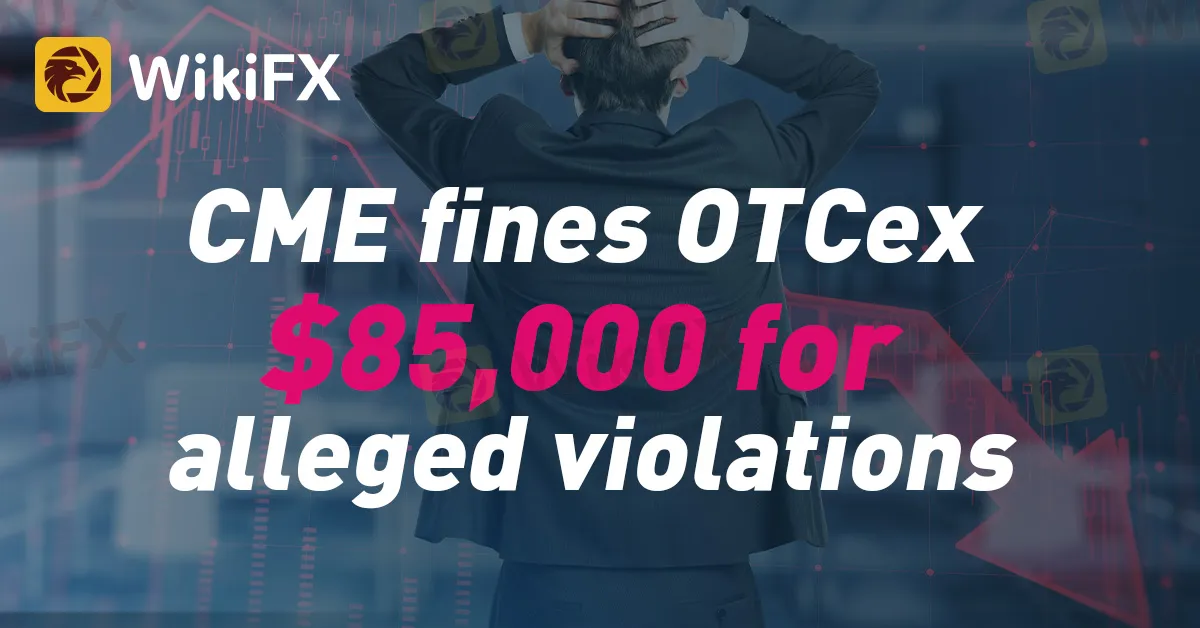简体中文
繁體中文
English
Pусский
日本語
ภาษาไทย
Tiếng Việt
Bahasa Indonesia
Español
हिन्दी
Filippiiniläinen
Français
Deutsch
Português
Türkçe
한국어
العربية
CME fines OTCex $85,000 for alleged violations
Abstract:The financial trading platform OTCex has agreed to pay an $85,000 fine to CME Group for its alleged violations.

The financial trading platform OTCex has agreed to pay an $85,000 fine to CME Group for its alleged violations.
The Business Conduct Committee of the Chicago Mercantile Exchange (CME) recently made findings regarding OTCex's trading activities. According to the committee, between September 8, 2021, and May 23, 2022, OTCex submitted multiple block trades to the Exchange in various futures contracts, including E-mini Consumer Staples Select Sector, E-mini Russell 2000 Index, E-mini Energy Select Sector, E-mini Industrial Select Sector, S&P 500 Annual Dividend Index, E-mini Financial Select Sector, E-mini Utilities Select Sector, E-mini Real Estate Select Sector, BTIC E-mini S&P 500, and Adjusted Interest Rate S&P 500 Total Return futures. However, it was discovered that these trades had inaccurate structures and execution times, and in some instances, OTCex failed to report the block trades to the Exchange within the required timeframe following execution.
Furthermore, the committee found that OTCex did not diligently monitor its employees and provide adequate training on the relevant Exchange rules and Market Regulation Advisory Notices to ensure compliance.
As a result of these findings, the Panel concluded that OTCex violated CME Rules 526, 526.F., and 432.W.
CME Rule 526 governs block trades and specifies the products eligible for such transactions and the minimum quantity thresholds. Subsection F states that the seller or broker handling the block trade must report each transaction to the Exchange within the specified time period and in the prescribed manner. The report must include details such as the contract, contract month, price, quantity, clearing members, execution time, and relevant information for options. The Exchange is responsible for promptly publishing this information separately from regular market reports.
In addition, CME Group Market Regulation Advisory Notice RA2019-5 highlights the requirements for block trade submissions to CME Clearing. It emphasizes the accurate reporting of execution times, as the execution time is determined by the parties involved in the trade. Failure to report accurate execution times may lead to disciplinary action.
Lastly, Rule 432.W. of the CME outlines general offenses, including the failure to diligently supervise employees and agents involved in business activities related to the Exchange.

Disclaimer:
The views in this article only represent the author's personal views, and do not constitute investment advice on this platform. This platform does not guarantee the accuracy, completeness and timeliness of the information in the article, and will not be liable for any loss caused by the use of or reliance on the information in the article.
Read more

DON’Ts DURING US Election 2024
In this article, we will talk about the key points a trader or investor must remember during the US Election. We’ll particularly talk about the don’ts. Let's start.

AI Triples U.S. Treasury’s Fraud Recovery to $1B in 2024
The U.S. Treasury's use of AI for fraud detection leads to a significant increase in recovery, reaching $1 billion in fiscal 2024, thanks to machine learning.

FB Investment Scam Cost Malaysian Housewife RM80K
A 50-year-old Malaysian housewife recently lost RM82,175 to a fraudulent investment scheme promoted on Facebook in July. The victim, a former secretary in a private company, was initially attracted to the enticing investment opportunity and followed a link from the advertisement that directed her to WhatsApp to connect with the scheme's operator.

The Role of Moving Averages in Trend Trading
Moving averages are essential tools in technical analysis, widely used by traders to identify trends and make informed decisions. By smoothing out price data, moving averages help traders filter out noise and determine the overall direction of a market, making them invaluable in trend trading strategies.
WikiFX Broker
Latest News
Angel One is an Ideal choice for you ?
StoneX Group Strengthens Indian Presence with Bullion Exchange Membership & New Offices
6 Trading Platforms That May Put Your Money at Risk
Indonesian Woman Lured into S$1.3 Million Forex Scam by Friend
Be a part of SquaredFinancial Live Talk show on US Election
FCA fines personnel £350,000 for failing to notify the FCA of significant tax issues
Broker Review: Is Sure FX Reliable?
ATTENTION! WARNING AGAINST FRAUD BROKERS
FOREX.com Partners with Kalshi for Event-Based Trading on US Election
Alameda Sues KuCoin to Reclaim $50M in FTX Asset Recovery Drive
Currency Calculator


